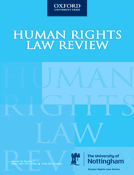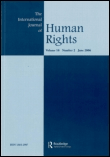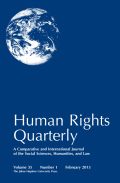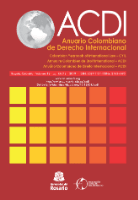
Human Rights Law Review
Scope & Guideline
Illuminating the Path to Justice and Equality
Introduction
Aims and Scopes
- Interdisciplinary Analysis of Human Rights:
The journal emphasizes interdisciplinary approaches, integrating perspectives from law, sociology, political science, and environmental studies to provide a comprehensive understanding of human rights issues. - Empirical Research and Case Studies:
It publishes empirical studies that analyze the effectiveness of human rights laws and treaties, as well as case studies that illustrate practical applications and challenges in various jurisdictions. - Focus on Regional Human Rights Mechanisms:
The journal explores the role and impact of regional human rights systems, such as the European Court of Human Rights and the Inter-American Court, examining their jurisprudence and evolving interpretations of rights. - Emerging Human Rights Issues:
It addresses emerging themes in human rights law, such as environmental rights, digital privacy, and the rights of marginalized groups, reflecting current global challenges. - Critical Examination of Legal Frameworks:
The journal critiques existing legal frameworks and practices, discussing their implications for the realization of human rights and proposing reforms based on scholarly insights.
Trending and Emerging
- Climate Change and Human Rights:
An increasing number of articles address the intersection of climate change and human rights, underscoring the urgency of environmental justice and the legal obligations states have to protect vulnerable populations. - Digital Rights and Technology:
The rise of technology and digital platforms has led to a growing interest in issues such as privacy, data protection, and the implications of artificial intelligence on human rights. - Rights of Marginalized Groups:
There is a notable trend towards exploring the rights of marginalized communities, including indigenous peoples, women, and LGBTQ+ individuals, aiming to amplify their voices and address systemic inequalities. - Economic, Social, and Cultural Rights:
The journal is increasingly focusing on economic, social, and cultural rights, particularly in the context of post-pandemic recovery and social justice, highlighting the importance of these rights in achieving overall human dignity. - Interdisciplinary Approaches to Human Rights:
Emerging themes reflect a growing integration of diverse academic disciplines, including public health, environmental science, and sociology, to better understand and address complex human rights issues.
Declining or Waning
- Traditional State-Centric Human Rights:
There is a noticeable decrease in papers focusing solely on state obligations and traditional approaches to human rights, indicating a shift towards more nuanced discussions that incorporate non-state actors and global governance. - Historical Perspectives on Human Rights:
Research that heavily emphasizes historical analyses of human rights frameworks is becoming less frequent, suggesting a trend towards contemporary and future-oriented discussions rather than retrospective evaluations. - General Theoretical Discussions:
Papers that engage in broad theoretical debates without specific contextual applications are less common, as the journal increasingly favors articles that connect theory to current human rights issues and practical implications.
Similar Journals

International Journal of Human Rights
Connecting Scholars to Transform Human Rights PerspectivesThe International Journal of Human Rights is a prestigious academic publication focusing on critical issues within the realm of human rights, law, sociology, and political science. Published by Routledge Journals, Taylor & Francis Ltd, this journal garners a significant reputation with a 2023 impact factor ranking it in the second quartile (Q2) within both the law and sociology categories. The journal provides a vital platform for researchers and scholars to disseminate original research, theoretical discussions, and comparative studies on pressing human rights concerns globally. With an impressive standing reflected in its Scopus ranks, placing it in the 84th and 72nd percentiles for law and sociology respectively, the journal plays an essential role in advancing the discourse on human rights. While it is not an open access publication, the journal prioritizes high-quality content and rigorous peer review, ensuring that it meets the academic standards demanded by its audience of researchers, professionals, and students committed to the advancement of human rights within diverse contexts.

Revista Latinoamericana de Derecho Social
Illuminating Social Legal Issues Across Latin AmericaRevista Latinoamericana de Derecho Social, published by the Nacional Autónoma de México, Instituto de Investigaciones Jurídicas, is a vital academic resource in the field of Law, particularly focused on social legal issues in the Latin American context. With an ISSN of 1870-4670 and an E-ISSN of 2448-7899, this journal has been actively contributing to legal scholarship since its inception in 2016 and is set to continue until 2024. Although it currently holds a Q4 ranking in the 2023 Law category and is positioned within the 10th percentile of Scopus rankings, the journal offers invaluable insights and rigorous analysis on legal frameworks and practices affecting social justice in Mexico and beyond. Though it operates as a regular publication, researchers and practitioners can access its articles to enhance their understanding of contemporary legal challenges. We encourage scholars, students, and legal professionals interested in social law and the interplay of legal systems in Latin America to consider this journal as a significant avenue for disseminating and engaging with critical legal research.

International Sports Law Journal
Defining the Future of Sports Law ScholarshipInternational Sports Law Journal (ISSN: 1567-7559, E-ISSN: 2213-5154) is a prominent publication in the field of sports law, published by SPRINGER HEIDELBERG. Located in the United States, this journal serves as a vital resource for researchers, professionals, and students interested in the legal aspects surrounding sports and athletics. With an impressive impact factor and ranked Q2 in Law (2023), it stands out in the academic community, holding the #230 position in the Scopus Social Sciences _ Law category, which represents the top 23% of journals in this field. The journal aims to provide a platform for scholarly discourse on a variety of subjects within sports law, including regulatory issues, international regulations, and case studies affecting athletes and sports organizations. Though it does not currently offer open access, the International Sports Law Journal is dedicated to publishing high-quality, peer-reviewed research that contributes to the development of sports law scholarship, thereby enhancing understanding and practice in this dynamic area.

European Law Review
Empowering Legal Research with Peer-Reviewed ExcellenceEuropean Law Review is a prominent academic journal dedicated to the comprehensive analysis and critical exploration of European legal issues. Published by SWEET MAXWELL LTD in the United Kingdom, this journal serves as a vital platform for scholarly discourse within the field, holding a commendable Q2 ranking in the Law category as of 2023. The journal's articles encompass a range of topics, including European Union law, human rights, and comparative legal studies, appealing to researchers, professionals, and students alike. With an H-index that reflects its academic influence and a solid Scopus ranking in the social sciences, the European Law Review remains an essential resource for those engaged in legal research and practice. While it is not an open-access journal, it offers rich, peer-reviewed content aimed at advancing knowledge and understanding of European law dynamics from 1995 to the present day.

Revista General de Derecho Europeo
Bridging Theory and Practice in European LawRevista General de Derecho Europeo is a prestigious academic journal dedicated to the study of European law, published by IUSTEL, a notable publisher recognized for its commitment to legal scholarship. This journal serves as a vital platform for the dissemination of cutting-edge research, fostering dialogue among scholars, practitioners, and policymakers in the field of European legal studies. With an ISSN of 1696-9634, it provides no-cost access to a diverse range of articles, ensuring that the latest developments in European jurisprudence are readily available to a broad audience. Although specific impact metrics such as the H-index are not detailed, the journal’s emphasis on quality and relevance positions it as an essential resource for anyone engaged in exploring the complexities of European law, its implications, and its evolution within a global context. Revista General de Derecho Europeo not only contributes to academic discourse but also equips its readers with critical insights necessary for navigating contemporary legal challenges in Europe.

HUMAN RIGHTS QUARTERLY
Exploring the frontiers of human rights scholarship.HUMAN RIGHTS QUARTERLY, published by Johns Hopkins University Press, stands as a pivotal forum for academics, policymakers, and practitioners dedicated to the study and advancement of human rights. Established in 1981, this esteemed journal addresses contemporary issues surrounding human rights norms and practices, fostering dialogue across diverse disciplines. With an impressive ISSN of 0275-0392 and E-ISSN of 1085-794X, it holds a significant place in the academic landscape, achieving a respectable Q3 ranking in both Social Sciences and Sociology and Political Science categories according to Scopus metrics. Although not an Open Access journal, it remains influential, with a robust readership and a commitment to disseminating critical research that promotes understanding and advocacy for human rights globally. As it converges varied scholarly perspectives from its inception through 2024, HUMAN RIGHTS QUARTERLY continues to inspire future generations of scholars interested in social justice and human rights advocacy.

Alternative Law Journal
Unpacking Complexities at the Intersection of Law and Sociology.Alternative Law Journal, published by SAGE Publications Ltd, stands as a pivotal platform for critical discourse within the fields of law, sociology, and political science. Since its inception in 2008, the journal has fostered innovative scholarship aimed at exploring the intersections of legal practices and social justice, making it an essential resource for researchers, practitioners, and students alike. With its current ranking at Q3 in both the Law and Sociology categories according to the latest Scopus metrics, the Alternative Law Journal ensures a robust academic discourse, promoting diverse perspectives and challenging conventional norms. The journal's address reflects its international reach, further underscoring its commitment to fostering a global dialogue on pressing legal and societal issues. This journal is crucial for anyone seeking to stay updated with contemporary thoughts and research impacting law and society.

Business and Human Rights Journal
Fostering critical dialogue on corporate accountability and human rights.Business and Human Rights Journal is a leading academic publication dedicated to the intersection of corporate responsibility and human rights, published by CAMBRIDGE UNIVERSITY PRESS. Since its inception in 2016, the journal has rapidly established itself as a vital resource for researchers, practitioners, and academics in the fields of Business and International Management, Industrial Relations, Law, and Sociology and Political Science, achieving a distinguished Q1 ranking in multiple categories in 2023. The journal's emphasis on contributive research and innovative perspectives fosters a critical dialogue on the responsibilities of businesses in ensuring human rights within their operations. With a robust impact factor and high Scopus rankings—placing it in the top 15% of Social Sciences Law and 25% of Sociology and Political Science—the Business and Human Rights Journal is essential reading for those engaged in advancing human rights in business practices globally.

International Organizations Law Review
Bridging Disciplines for a Comprehensive Understanding of Global GovernanceInternational Organizations Law Review is a distinguished academic journal published by BRILL, focusing on the interdisciplinary intersections of law, political science, and economics in the context of international organizations. With an ISSN of 1572-3739 and an E-ISSN of 1572-3747, this journal has been a key player in advancing scholarly dialogue since its inception in 2004, and it is set to continue its vital contribution until 2024. Though currently categorized in the Q4 quartile across various domains, including Economics and Law, it holds a respectable position within Scopus rankings, indicating its growing influence in the social sciences. Researchers and professionals looking for critical insights and the latest research in international law and organizational dynamics will find this journal invaluable. The International Organizations Law Review is committed to fostering a deeper understanding of the legal frameworks governing international interactions, making it an essential resource for students and academics alike.

Anuario Colombiano de Derecho Internacional-ACDI
Elevating Global Legal Discourse from ColombiaAnuario Colombiano de Derecho Internacional-ACDI, published by UNIV ROSARIO, EDITORIAL, is a pivotal open-access journal established in 2008, focusing on the field of international law. Situated in Colombia, this journal serves as a vital platform for scholars, practitioners, and students to disseminate and discuss pivotal legal issues that resonate within an increasingly globalized context. With an impact factor reflecting its relevance—ranking in the Q3 category of law and positioned at the 33rd percentile among legal journals in the Scopus ranking—ACDI is a commendable source for academic research. The journal operates under a rigorous peer-review process, ensuring high standards of scholarly communication. Its commitment to accessibility fosters a broader dialogue among legal professionals worldwide, making it an essential resource for advancing knowledge and discourse in international law.